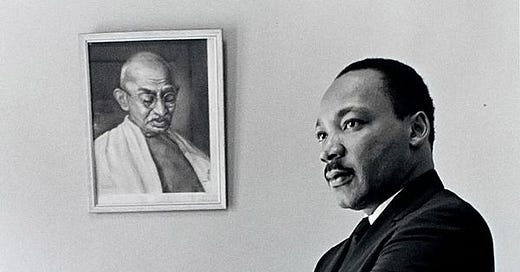The Inner Scorecard
On April 3, Martin Luther King Jr stood before an audience in Mason, Tennessee for 45 minutes to deliver an address that has come to be known as “I’ve Been To The Mountaintop Speech”. In the concluding words, King said,
“Like anybody, I would like to live a long life. Longevity has its place. But I'm not concerned about that now. I just want to do God's will. And He's allowed me to go up to the mountain. And I've looked over. And I've seen the Promised Land. I may not get there with you. But I want you to know tonight, that we, as a people, will get to the promised land!
And so I'm happy, tonight.
I'm not worried about anything.
I'm not fearing any man!
Mine eyes have seen the glory of the coming of the Lord!!”
The next day, April 4th, Martin Luther King Jnr was fatally shot by James Earl Ray. He did not survive. He died on the same day. King was just 39!
I am currently reading a biography of Warren Buffet by Alice Schroeder. It occurred to me that if Martin Luther King was not shot on that fateful day in 1968, he could still be alive today. Warren Buffet was born in 1930. Martin Luther King was born in 1929. They were contemporaries. As far back as 1968, King had already defined what he wanted his legacy to be.
“I just want to do God's will.”
Not just that, he told us the things he doesn’t care about. “Like anybody, I would like to live a long life. Longevity has its place. But I'm not concerned about that now.”
King had discovered his Inner Scorecard.
What is The Inner Scorecard? The concept of the Inner Scorecard is a personal evaluation system where you judge your life and performance based on your own standards and values rather than external validation or societal expectations. The Inner Scorecard is the cards you set for yourself.
There is an Inner Scorecard and Outer Scorecard. The Outer Scorecard includes all the public acclaims. For the most inspirational and fulfilling people, the Inner Scorecard is far more important. They live by the Inner Scorecard.
Let me tell you about one of my heroes.
Muhammad Yunus is one of the most inspiring figures in modern history. He is from Bangladesh. His bank, Grameen Bank, is responsible for lifting people out of poverty more than any other institution. In 2006, Muhammad Yunus won the Nobel Peace Prize. If you pay attention, the Nobel Peace Prize is the highest award that can be given to anyone on this earth. Winning the Nobel Peace Prize is the kind of final achievement that most people crave for. Former US President Donald Trump has devoted quite a few tweets to ranting about how he deserves a Nobel Peace Prize. But you know what Muhammad Yunus did when he received his prize? He told the world that receiving the Nobel Prize is not the prize; the prize is lifting people out of poverty.
No wonder his bank has lifted more than 45 million people out of poverty.
In the case of Muhammad Yunus;
Outer Scorecard = the Nobel Prize.
Inner Scorecard = lifting people out of poverty.
You see, society, family, and associations will always give us a scorecard. Colleagues at work will measure their lives by the cars they have. Students at school will measure their lives by their grades. Friends circle will measure their lives by when and how they got married. These are all outer scorecards. The surprising thing is that most people live by these.
Today, I am sending this newsletter to remind you that there is an Inner Scorecard. When you get to the end of your life, you will give account to yourself, and on that day none of these will matter. The most important thing that will matter is the scorecard you set for yourself.
What is your Inner Scorecard? What is your prize?
Don’t tell me. Write it down. And live up to it.




